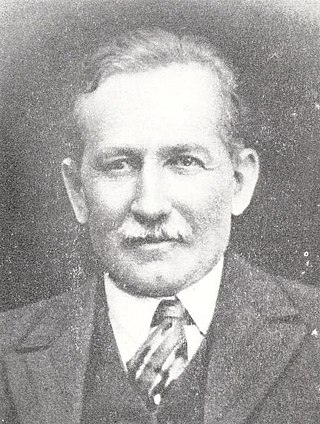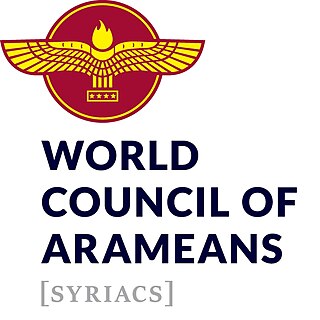
Assyrians are an indigenous ethnic group native to Mesopotamia, a geographical region in West Asia. Modern Assyrians descend directly from Ancient Mesopotamians such as ancient Assyrians and Babylonians. Modern Assyrians may culturally self-identify as Syriacs, Chaldeans, or Arameans for religious, geographic, and tribal identification.
The Royal Academies for Science and the Arts of Belgium (RASAB) is a non-governmental association that promotes and organises science and the arts in Belgium by coordinating the national and international activities of its constituent academies such as the National Scientific Committees and the representation of Belgium in international scientific organisations.

The International Federation of Journalists (IFJ) is the largest global union federation of journalists' trade unions in the world. It represents more than 600,000 media workers from 187 organisations in 146 countries.

Naum Elias Yaqub Palakh, better known as Naum Faiq, was an Assyrian poet, journalist, and teacher, remembered as one of the founding fathers of modern Assyrian nationalism during the early 20th century. He was a teacher and writer throughout his life. As a Syriac Orthodox Christian, he emphasized the importance of unity among Syriac Christians and encouraged his community to depart from "tribal mentality".

Richard Nelson Frye was an American scholar of Iranian and Central Asian studies, and Aga Khan Professor Emeritus of Iranian Studies at Harvard University. His professional areas of interest were Iranian philology and the history of Iran and Central Asia before 1000 CE.
The European Association of Craft, Small and Medium-Sized Enterprises or SMEunited is an umbrella group for associations of SMEs based in Brussels, Belgium. SMEunited represents the interests of European crafts, trades and SMEs at EU level. Its 67 member organisations from 34 European countries consist of national cross-sectorial SME federations, European branch federations and other associate members. Its members combined represent more than 12 million enterprises, which employ around 50 million people across Europe. SMEunited is a recognised European Social Partner.

The Confederation of European Scouts, called in French Confédération Européenne de Scoutisme and abbreviated as CES, was formed in Brussels, Belgium, on 12 November 1978 and is still based in Belgium. CES stresses the European dimension of the Scouting programme and claims to provide the "authentic Scouting of Baden-Powell". The CES is a confederation of national federations. The CES is a split-off from the Fédération du Scoutisme Européen (FSE) later renamed to the Union Internationale des Guides et Scouts d'Europe; it left after controversies about the importance of religious elements in the single associations' programs and co-education. The exact number of members of the CES is unknown.

The Assyrian diaspora refers to ethnic Assyrians living in communities outside their ancestral homeland. The Eastern Aramaic-speaking Assyrians claim descent from the ancient Assyrians and are one of the few ancient Semitic ethnicities in the Near East who resisted Arabization, Turkification, Persianization and Islamization during and after the Muslim conquest of Iraq, Iran, Syria and Turkey.

Iraqi Assyrians are an ethnic and linguistic minority group, indigenous to Upper Mesopotamia. They are defined as Assyrians residing in the country of Iraq, or members of the Assyrian diaspora who are of Iraqi-Assyrian heritage. They share a common history and ethnic identity, rooted in shared linguistic, cultural and religious traditions, with Assyrians in Iran, Turkey and Syria, as well as with the Assyrian diaspora elsewhere. A significant number have emigrated to the United States, notably to the Detroit and Chicago; a sizeable community is also found in Sydney, Australia.

Assyrians in Iran, or Iranian Assyrians, are an ethnic and linguistic minority in present-day Iran. The Assyrians of Iran speak Assyrian Neo-Aramaic, a neo-Aramaic language descended from Classical Syriac and elements of Akkadian, and are Eastern Rite Christians belonging mostly to the Assyrian Church of the East and also to the Ancient Church of the East, Assyrian Pentecostal Church, Chaldean Catholic Church and Assyrian Evangelical Church.

Assyrians in Syria also known as Syriacs are an ethnic and linguistic minority that are indigenous to Upper Mesopotamia, the north-eastern half of Syria. Syrian-Assyrians are people of Assyrian descent living in Syria, and those in the Assyrian diaspora who are of Syrian-Assyrian heritage.

The Assyrian homeland, Assyria, refers to the homeland of the Assyrian people within which Assyrian civilisation developed, located in their indigenous Upper Mesopotamia. The territory that forms the Assyrian homeland is, similarly to the rest of Mesopotamia, currently divided between present-day Iraq, Turkey, Iran and Syria. In Iran, the Urmia Plain forms a thin margin of the ancestral Assyrian homeland in the north-west, and the only section of the Assyrian homeland beyond the Mesopotamian region. The majority of Assyrians in Iran currently reside in the capital city, Tehran.

The European Confederation of Police (EuroCOP) is the umbrella organization umbrella organisation for 30 police unions and staff organisations in Europe. Representing the interests of over 230,000 police officers in 25 European countries, it was founded in 2002 at a conference in Roskilde, Denmark, emerging from the Union Internationale des Syndicats de Police (UISP), which had existed since 1953. It was created in order to enable further organizations, particularly ones from the United Kingdom, to join. The union's headquarters is in Luxembourg.

Assyrian Universal Alliance, usually abbreviated as AUA and popularly known as Khoyada is an ethnic Assyrian worldwide umbrella organization made up of different sectors of the Assyrian federations and organizations throughout the world.
Assyrians/Syriacs in Sweden are citizens and residents of Sweden who are of Assyrian/Syriac descent. There are approximately 150,000 Assyrians/Syriacs in Sweden.

The Quaker Council for European Affairs (QCEA) is an international not-for-profit organisation which seeks to promote the values and political concerns of the Religious Society of Friends (Quakers) at the European level. It undertakes research and advocacy in the fields of peacebuilding and human rights policy, notably in relation to the European Union and the Council of Europe. Founded in 1979 by Quakers who worked in the European institutions, it is based in Brussels, Belgium and is registered under Belgian law.

World Council of Arameans (Syriacs), previously known as the Syriac Universal Alliance (Syriac: ܚܘܝܕܐ ܣܘܪܝܝܐ ܬܒܝܠܝܐ, romanized: Ḥuyōdō Suryōyō Tbelōyō), is an international non-government umbrella organization, whose membership consists of several national associations, representing Arameans (also known as Syriac) from various countries around the world. Position of the SUA/WCA president is regarded as representative within Aramean/Syriac community. Since 2009, the organization is presided by Johny Messo.
This is a list of Assyrian populations by country according to official and estimated numbers. Due to a lack of official data in many countries, estimates may vary.
Kani Masi or Ain Nuni is a village and sub-district in Dohuk Governorate in Kurdistan Region, Iraq. It is located in the district of Amadiya and the historical region of Barwari Bala.

Assyrians in Belgium are Belgian citizens of Assyrian descent. Belgium's Assyrian diaspora is concentrated in the Flemish cities of Mechelen and Antwerp, although there are also significant numbers living in Liège and Brussels. The majority of the Assyrian diaspora living in Belgium are of Turkish descent, mostly from the towns of Bohtan (Beth-Qardu), Tur-Abdin and Hakkâri.














